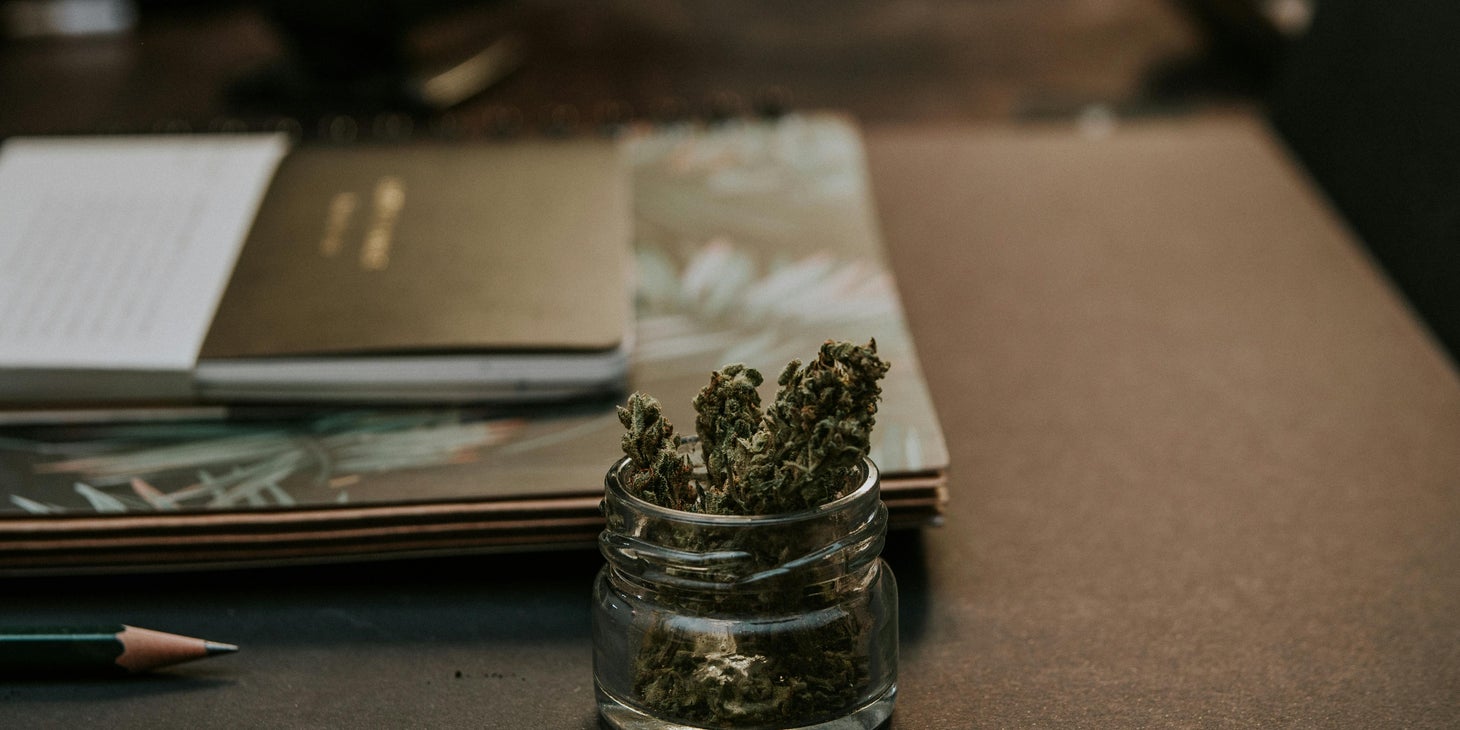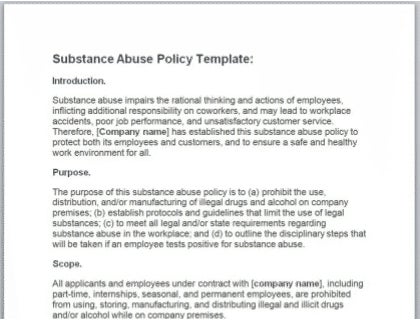
Toni Ross is the Senior Editor of Betterteam. Her interests include developing resources that help build and grow value-oriented, connected teams, both personal and professional.

A substance abuse policy is a set of guidelines that outline a business's protocol for substance abuse in the workplace. It should be a customized document that addresses issues relating to prescribed medication, illegal drugs, and alcohol abuse. Depending on the type of business you own, a substance abuse policy can be required by law.
Creating a well-informed substance abuse policy will help ensure your workplace remains drug and alcohol-free, ultimately maintaining the safety of all employees as well as the quality of customer service.

Download this substance abuse policy template in Microsoft Word format.
Substance abuse impairs the rational thinking and actions of employees, inflicting additional responsibility on coworkers, and may lead to workplace accidents, poor job performance, and unsatisfactory customer service.
Therefore, [company name] has established this substance abuse policy to protect both its employees and customers, and to ensure a safe and healthy work environment for all.
The purpose of this substance abuse policy is to (a) prohibit the use, distribution, and/or manufacturing of illegal drugs and alcohol on company premises; (b) establish protocols and guidelines that limit the use of legal substances;
(c) meet all legal and/or state requirements regarding substance abuse in the workplace; and (d) outline the disciplinary steps that will be taken if an employee tests positive for substance abuse.
All applicants and employees under contract with [company name], including paid interns, volunteers, and part-time, seasonal, and permanent employees, are prohibited from using, storing, manufacturing, and distributing illegal and illicit drugs and/or alcohol while on company premises.
While on duty at [company name], employees are prohibited from:
Applicants who are being considered for a job position at [company name] will be required to pass a drug test before signing an official contract. If an applicant declines a drug test or fails to fully cooperate, he/she will immediately be disqualified.
An employee will be subject to a drug test or formal investigation if at least [number of employees] employees, including a team leader, supervisor, or manager, has witnessed irregular behavior, workplace use of prohibited substances, or physical impairment due to substance abuse.
Additionally, [company name] requires the employee(s) to complete a Reasonable Suspicion Checklist to document their observations.
Before formally approaching the employee in question, the human resources (HR) department should be contacted for assistance on how to respond. If there is sufficient proof of substance abuse, management, HR, and the employee in question will convene for a formal meeting.
The employee in question also reserves the right to ask for a witness or union representative to join the discussion.
If there is a probable belief that an employee was under the influence during a work-related accident or while operating a [company name] vehicle, machine, and/or valuable device, the employee(s) in question will be required to undergo a drug test.
In this scenario, the employee(s) in question would have to undergo a drug test within [number of hours] hours after the incident occurred.
If an employee does not submit to an authorized drug test or participates in the usage, distribution, and/or manufacturing of illegal drugs while on [company name's] premises, he/she will be subject to disciplinary action, up to and including termination.
Team leaders, supervisors, and managers are required to immediately report employees that are in violation of this policy. If an employee declines to participate in a drug test but is believed to be under the influence of drugs and/or alcohol, the employee in question will not be allowed to enter the workplace or interact with customers.
[Company name] does reserve the right to offer an employee that tests positive for drugs and/or alcohol the opportunity to return to work, depending on the case circumstances and state requirements. In this scenario, the employee in question will be required to undergo regular drug testing for the minimum of [number of months/years].
If the employee in question tests positive during the probation period or refuses to participate in a drug test, he/she will be subject to further disciplinary action, up to and including termination.
Yes, if its backed by substantial proof. However, an employee cannot be asked to take a drug test against their will. Employers do reserve the right to fire an employee if they refuse to take a drug test.
A drug-free workplace policy is an alternative term used to describe a substance abuse policy. A drug-free workplace policy outlines a business's rules and guidelines when it comes to using drugs and/or alcohol while on duty.
A good substance abuse policy clearly outlines and explains the processes, guidelines, and rules of using, manufacturing, or distributing illegal or prescribed drugs, and/or alcohol while on duty. The policy should include a purpose, scope, workplace rules, testing requirements, and disciplinary action.
While under the influence of drugs or alcohol, an employee can pose a burden to coworkers or be the cause of work-related accidents. Therefore, to protect all employees and promote a safe and healthy work environment, businesses choose to implement a substance abuse policy. In addition, some businesses are legally required to institute a substance abuse policy due to the nature of the work.